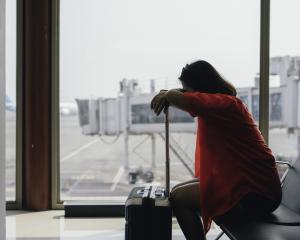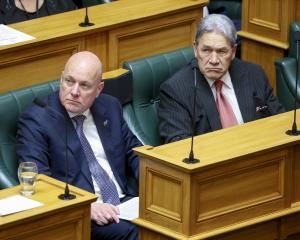

Even when you can understand what he is saying, it does not always make sense. He can emphatically say "Go away!" repeatedly to his father while at the same time clinging to him.
Most of the time in our discussions I take the course of least resistance, agreeing wholeheartedly with whatever it is he is so enthusiastically telling me.
From time to time the communication divide, or being stopped from doing something he thinks is his right, means his frustration takes over, making him stop to clench every muscle he can until he shakes.
It is hard not to laugh.
What is not so funny is the amount of gibberish we adults talk about the environment without doing much to help it. Perhaps we need some of that urgent toddler energy.
At the weekend as I paddled in the unappetising-looking Manuherikia River near Shaky Bridge, listening to my 30-something son and daughter-in-law’s recollections of jumping off the rocks into deep pools there in their teenage fruit-picking years, it was hard not to think about the Otago Regional Council’s procrastination over setting minimum flows for it. It might have been great for the toddler to potter about in water that did not reach my knees, but was this the result of a dry summer or summers or the aftermath of too much water being extracted from the river?
At the other end of the country where too much water has been causing problems, the irascible mayor of our largest city, faced with devastating flooding, initially didn’t seem willing or able to consider it had anything to do with climate change. A couple of days later, however, he conceded it did.
But it might be too much to hope the floods will push us to join the dots on climate change.
In the aftermath of the floods the fuel subsidy was extended, despite finance minister Grant Robertson warning last year it was not indefinitely sustainable. (Did it ever have anything to do with sustainability?). This change of heart was blamed on Jacinda Ardern’s resignation and blather was also talked about being nimble and responsive.
We need to be nimble and responsive over climate change, which surely includes trying to get more people to reduce their carbon footprint. Does keeping a fuel subsidy encourage anyone who could reduce their fuel consumption to do so?
There must be other ways, as Green co-leader James Shaw suggests, of providing support to low-income families and those struggling with the cost of living without directly subsidising harmful fossil fuels.
Regular readers will be sick of me saying I hoped the enforced breather provided by the Covid pandemic would give us the opportunity to boldly re-think the way we did almost everything.
But has it gone much beyond a greater acceptance of working from home and doing more online?
As far as I can tell, the great tourism re-set, which was supposed to be less volume-driven and focus on quality and value extended stays, is more talk than action. Cruise ship visitors certainly do not fit that mould (and don’t get me started on the environmental impacts of those Covid petri dishes).
The mainstream media has enthusiastically reported the excitement of the return of air travel, confining any weeping and wailing and gnashing of teeth to concerns about lost luggage and the high price of fares rather than opt for any real examination of how much of this travel is necessary or its environmental impact.
I am with those 11 academics who wrote an open letter to the prime minister and anybody who might be involved with decision making over the Christchurch Airport proposal for a new airport for Central Otago, or what I like to call The last Quango in Tarras.
The academics, from a variety of disciplines, say it should not go ahead. We are all being asked to curb emissions but this flies in the face of that.
It has been confirmed the proposed airport would be built for long-haul wide-bodied jets.
Such an airport would be designed to stimulate demand and easily expand its capacity further in the future.
This approach is fundamentally at odds with the urgent need to halve carbon emissions by 2030 in accordance with Paris 2015 climate commitments, the letter says.
It also points out the folly of expecting zero-carbon aviation to save the day any time soon as this promise is based on technologies which do not yet exist.
Talking nonsense and playing let’s pretend can be charming in toddlers, but when it comes to climate change and the environment we need grown-up decision makers who are sensible straight talkers, even if it makes some of us clench all our muscles until we shake.
- Elspeth McLean is a Dunedin writer.












